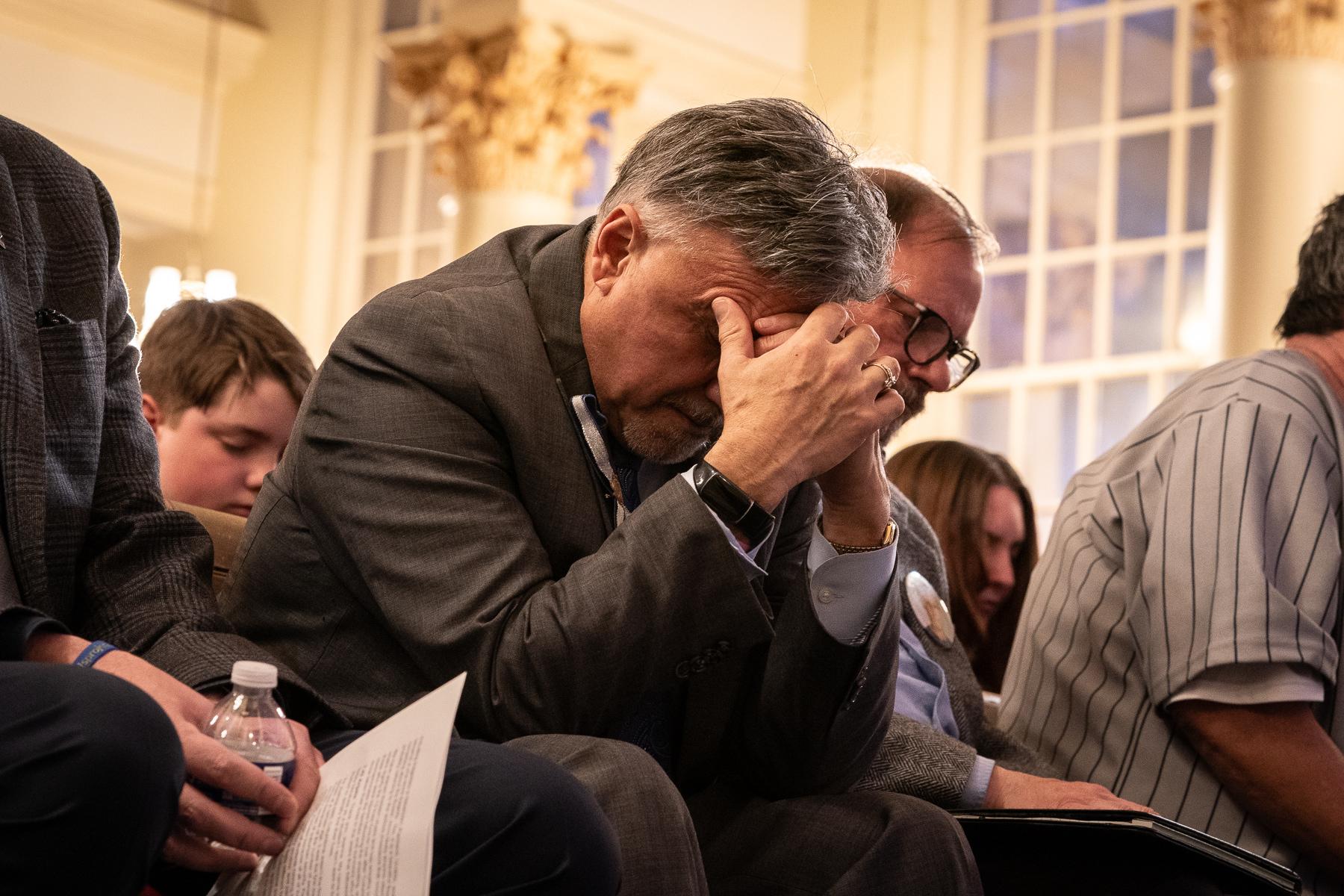Denver voters will soon choose their new mayor. Candidates Michael Hancock and Chris Romer are both Democrats...but differ in style and upbringing. CPR’s Ben Markus starts our profiles with Michael Hancock...a relative newcomer to politics with a compelling life story.
Reporter: On a recent Friday afternoon City Councilman Michael Hancock huddles with campaign volunteers around a picnic table in Crescent Park. A staffer puts a map of the area in front of them, each red dot on the map is a registered voter.
Staffer: Right here, here’s Crescent Park. How about that?
Hancock: So this is up Syracuse...man, there’s a lot of red dots on this puppy.
Reporter: Hancock says he’s lost 15 pounds since he started walking Denver neighborhoods, knocking on doors asking for people’s vote.
Hancock eventually runs into Jamie Diamant whose 2-year-old son Alex has a question for the mayoral candidate.
Alex: What’s your name?
Hancock: Michael. Can you say Michael?
Alex: Michael.
Hancock: Oh, you’re good.
Jamie: Can you say Hancock?
Alex: Hancock.
Hancock: Thank you, Alex.
Jamie Diamant: Thank you.
Hancock: No, thank you. I would appreciate your consideration for mayor, OK.
Reporter: Unlike his opponent Chris Romer, who comes from a well-known political family, Hancock has spent a lot of his campaign introducing himself to Denver voters. Born and raised in Denver he grew up in poverty. His alcoholic father abandoned his family. One of his brothers died of AIDS, and a sister was murdered. Hancock nevertheless persevered...went to college and eventually graduate school. He says he’s blessed to have a “challenged” background.
Hancock: And I mean that because I think it helped build me into the man that I am today. One that tends to understand a little better where people are coming from. Their challenges, their opportunities.
Reporter: In his eight years on the city council he’s fought passionately for his northeast district...among other things helping pass police reforms and major bond initiatives.
One of Hancock’s biggest supporters is former Mayor Wellington Webb. Webb remembers a young Hancock, still in high school, asserting that he’d be the first black mayor of Denver.
Webb: He can be second. He can’t be first because I’ve already done that.
Reporter: And Webb is supporting that effort because of what he says are Hancock’s unique leadership skills.
Webb: Michael has the ability, which is an innate ability is to feel comfortable wherever he is. That there’s not a constituency that he doesn’t feel comfortable with or that he knows.
Reporter: Fellow councilman and Hancock supporter Charlie Brown agrees. He says Hancock was elected council president partly because of his ability to broker compromise--something that doesn’t grab headlines, but...
Brown: It’s important, and you get rigidity on both sides and Michael can pull people together and say this is going to be it. And he, at the same time, when it is necessary, he can be cowboy tough. And I’ve seen that.
Reporter: But Hancock’s opponents are skeptical that a city councilman can make a good mayor. No city councilperson has ever won the mayor’s office. That’s why James Mejia, who finished third in the mayoral election earlier this month, has endorsed Chris Romer.
Mejia: I’m not convinced that the city council experience is one that prepares you well to lead in the executive branch of government.
Reporter: Mejia worked under both Webb and John Hickenlooper. He says city council passes laws, it doesn’t have to implement them...that takes strong executive experience.
Hancock says he got that experience as the youngest chapter president of the Urban League, an inne-rcity non-profit. And Hancock says as councilman he’s learned how to work within the city’s political system and won’t shake things up as much as Romer will.
Hancock: So if you come in with the attitude that. ‘I’ve got to throw some elbows,’ and with the attitude that, ‘I’ve got to break some china,’ I think you already start at a deficit and you have to have some plan and some integrity to convince these city employees to work with you.
Reporter: In recent weeks Romer has stepped up negative ads, targeting Hancock’s vote to increase the future salaries of the mayor and city council during a budget crisis. Hancock says the city rules required the council to consider raises and he said he’d give his to charity if he wins. Hancock has stayed positive with his campaign, something he admits is a risk.
Hancock: But I also know I’ll walk away from this election no matter what the outcome feeling good about the way I did it.
Reporter: Hancock says he’s busy calling donors, raising money to keep his ads on the air. And he’ll probably lose more weight canvasing Denver neighborhoods leading up to the June 7th election.
[Photo Courtesy of Hancock campaign]









